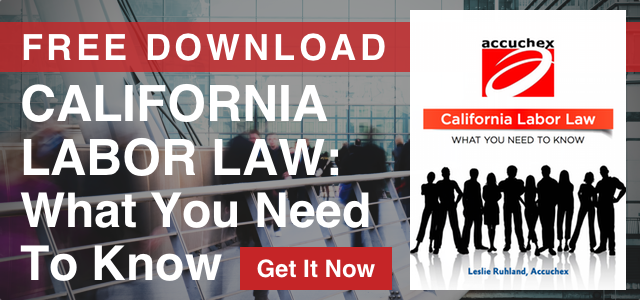
When it comes to CA Labor Laws and Overtime Exemption, most employers know by now that the Final Rule on overtime exempt status was issued last month.
On May 18, 2016, President Obama and Department of Labor Secretary Perez announced the publication of the Department of Labor’s (DOL) final rule updating the overtime regulations. The updated rule will become effective on December 1, 2016 and will automatically extend overtime pay eligibility to as many as 4.2 million workers within its first year.
Re-Defining Salary Level Exemptions Under the Fair Labor Standards Act
The changes were set in motion back in 2014 when President Obama signed a Presidential Memorandum directing the DOL to update the regulations that define which white collar workers are protected by the FLSA's minimum wage and overtime standards.
The following year, on July 6, 2015, the DOL published a Notice of Proposed Rulemaking (NPRM) in the Federal Register and invited interested parties to submit written comments on the proposed rule by September 4, 2015.
The Department of Labor eventually received almost 300,000 comments in response to the Notice from a variety of organizations and business owners. The feedback the Department received helped shape the Final Rule.
CA Labor Laws, Overtime Exemption, New FLSA Rule and the Impact on Employers
According the California Retailers Association, California’s retail industry currently operates over 164,200 stores with sales in excess of $571 billion annually and employing 2,776,000 people—nearly one fifth of California’s total employment.
The new overtime rules will have a significant impact on the management of this employment sector.
The National Retail Federation (NRF) released a study detailing the impact the new rules will have on the retail and restaurant industries.
The Credit Union National Association (CUNA) actively advocated against the rule change. “We are obviously disappointed but not surprised by the final overtime rule,” said Ryan Donovan, CUNA chief advocacy officer.
“America's credit unions work every day to improve the financial livelihood of their members--more than 105 million strong. Nevertheless, the finalized changes add to the regulatory burden that credit unions face and will impair their ability to provide affordable financial services to millions of Americans.”
CUNA is concerned that credit unions could be forced to limit services as a result of changed employment situations or the inability to hire full-time employees.
Preparing for the December 1, 2016 Deadline
This infographic illustrates a number of the key statistics behind the Final Rule and the potential impact on employers.

Share this Image On Your Site
The Challenge is for Businesses With Many Low-Threshold Exempt Workers
Employers will need to educate themselves or avail themselves of the professional assistance and resources that are currently available to them.
Before the Final Rule goes into effect on December 1st, employers should assess which employees will be affected, and how the employer will want to respond. One approach would be to raise the salaries and compensation of these employees to meet the new salary/compensation thresholds.
This course of action may impose not only direct costs, but also indirect costs by creating pressure to raise salaries for other employees higher up on the organizational chart, or causing disgruntlement for those employees if the salary differential is reduced.
Another approach would be to re-classify exempt employees as non-exempt and pay them overtime in accordance with the FLSA. To control costs associated with this approach, employers may be tempted to limit hours of non-exempt employees to 40 per week, or even consider reducing hourly rates to offset their expected future overtime earnings.
Getting Expert Help to Stay Up to Date and In Compliance
An updated payroll compliance strategy will help your organization meet its obligations, while providing accuracy and timeliness. So take time to understand the laws, prioritize employee and manager salary changes, and maintain accurate record keeping. In this way, you will make compliance a sure thing.
Another key step in maintaining HR compliance and increasing your company's cost-effectiveness is to consider outsourcing. A professional payroll management and workforce solutions provider such as Accuchex can offer much-needed help with Human Resources needs and questions.
Accuchex is a full spectrum Payroll Management Services provider offering expertise in Time Management, Insurance and Retirement issues, as well.


